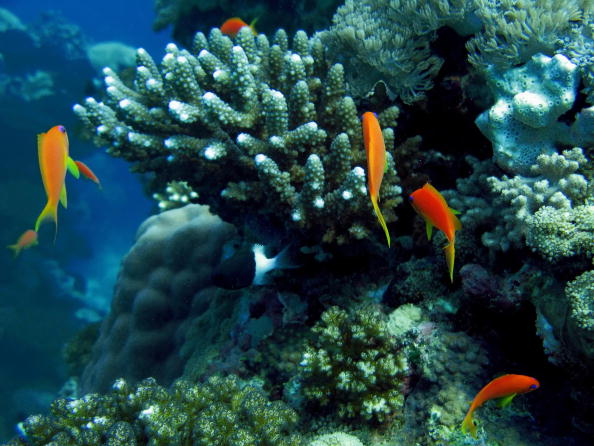An unidentified disease is ravaging Florida's 360-mile-long coral reef


Florida is home to the world's third-largest coral reef, but it's quickly crumbling away.
Rising ocean temperatures have bleached Florida's corals, making them prone to disease — including the one that is currently ravaging the 360-mile-long reef. A bacterial disease has swept through nearly half of Florida's corals over the past four years, and NPR says that the unidentified infection can kill a coral within weeks.

Coral bleaching, which turns reefs white and weak, has even reached Australia's Great Barrier Reef.
The Week
Escape your echo chamber. Get the facts behind the news, plus analysis from multiple perspectives.

Sign up for The Week's Free Newsletters
From our morning news briefing to a weekly Good News Newsletter, get the best of The Week delivered directly to your inbox.
From our morning news briefing to a weekly Good News Newsletter, get the best of The Week delivered directly to your inbox.
Luckily, Florida's corals have science on their side. NPR shared the endeavors of Mote Marine Lab's Center for Coral Reef Research and Restoration, where scientists are growing baby corals in controlled tanks. Once they've matured, the fledglings are replanted into adult reefs to reproduce.
Many transplants have proved resistant to the mystery disease, something the Mote Lab's science director called a "beacon of hope." The lab is still looking for a way to stop the epidemic, but in the meantime, replanting looks like the only way to save coral from collapse.
A free daily email with the biggest news stories of the day – and the best features from TheWeek.com
Kathryn is a graduate of Syracuse University, with degrees in magazine journalism and information technology, along with hours to earn another degree after working at SU's independent paper The Daily Orange. She's currently recovering from a horse addiction while living in New York City, and likes to share her extremely dry sense of humor on Twitter.
-
 Which way will Trump go on Iran?
Which way will Trump go on Iran?Today’s Big Question Diplomatic talks set to be held in Turkey on Friday, but failure to reach an agreement could have ‘terrible’ global ramifications
-
 High Court action over Cape Verde tourist deaths
High Court action over Cape Verde tourist deathsThe Explainer Holidaymakers sue TUI after gastric illness outbreaks linked to six British deaths
-
 The battle over the Irish language in Northern Ireland
The battle over the Irish language in Northern IrelandUnder the Radar Popularity is soaring across Northern Ireland, but dual-language sign policies agitate division as unionists accuse nationalists of cultural erosion
-
 EU and India clinch trade pact amid US tariff war
EU and India clinch trade pact amid US tariff warSpeed Read The agreement will slash tariffs on most goods over the next decade
-
 Israel retrieves final hostage’s body from Gaza
Israel retrieves final hostage’s body from GazaSpeed Read The 24-year-old police officer was killed during the initial Hamas attack
-
 China’s Xi targets top general in growing purge
China’s Xi targets top general in growing purgeSpeed Read Zhang Youxia is being investigated over ‘grave violations’ of the law
-
 Panama and Canada are negotiating over a crucial copper mine
Panama and Canada are negotiating over a crucial copper mineIn the Spotlight Panama is set to make a final decision on the mine this summer
-
 Why Greenland’s natural resources are nearly impossible to mine
Why Greenland’s natural resources are nearly impossible to mineThe Explainer The country’s natural landscape makes the task extremely difficult
-
 Iran cuts internet as protests escalate
Iran cuts internet as protests escalateSpeed Reada Government buildings across the country have been set on fire
-
 US nabs ‘shadow’ tanker claimed by Russia
US nabs ‘shadow’ tanker claimed by RussiaSpeed Read The ship was one of two vessels seized by the US military
-
 Maduro pleads not guilty in first US court hearing
Maduro pleads not guilty in first US court hearingSpeed Read Deposed Venezuelan leader Nicolás Maduro and his wife Cilia Flores pleaded not guilty to cocaine trafficking and narco-terrorism conspiracy
